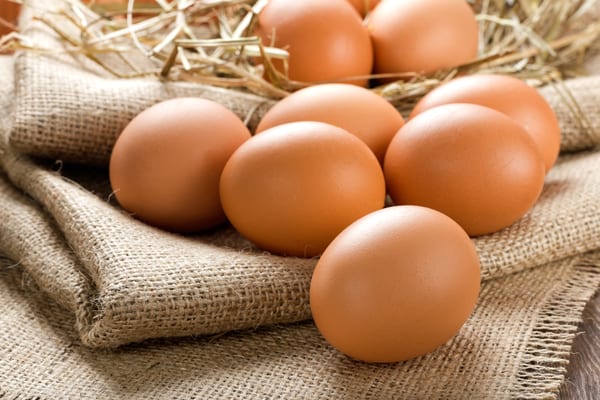For more than two years, farmers have fought a battle with a fatal strain of bird flu that continues to disrupt the U.S. egg supply. At one point, the shortage sent the price of a dozen regular eggs soaring to almost $5. Prices retreated somewhat, but they remain volatile.
As Nerd Wallet reports, the current spike coincides with shifts in shopping habits. Demand tends to rise in the fall and winter, says Brian Earnest, an animal protein economist with CoBank. Seasonal baking calls for increased egg use in home kitchens. And students of all ages go back to eating meals in cafeterias and dining halls, where eggs might feature prominently.
Meanwhile, flocks of egg-laying hens are smaller because producers haven’t recovered from losses to bird flu over the past two years, Earnest says. “It seems like they can’t get over this bird flu outbreak issue.”
Egg prices rose nearly 38% in one year
The average cost of a dozen Grade A large eggs was $3.65 in November, up from $3.37 in October, according to data from the U.S. Bureau of Labor Statistics, retrieved from the Federal Reserve Bank of St. Louis’ FRED site. The latest consumer price index, or CPI, shows that the price of eggs is up 37.5% from where it was a year ago. That’s in contrast to the trajectory of food prices overall, which rose just 2.4% in the past year.
BLS data tracking egg prices goes back to at least 1980, when large, Grade A eggs cost $0.88 a dozen, not adjusted for inflation. Before February 2022, the average cost of a dozen had largely stayed below $2 since March 2016. Then, the price of eggs more than doubled from the beginning of 2022 until hitting its peak of $4.82 per dozen in January 2023.
Why are eggs so expensive?
The pandemic and inflation have both played a role in rising egg prices, but the real culprit is an outbreak of H5N1, a highly transmissible and fatal strain of avian influenza, or bird flu. The outbreak started in early 2022 and quickly grew into the largest bird flu outbreak in U.S. history. As of Dec. 10, the virus has affected more than 120.57 million birds in the U.S. since January 2022, according to the Centers for Disease Control and Prevention.
With so many birds lost to the virus, egg production is below normal levels and can’t keep up with consumer demand. That dynamic leads to higher prices. And prices will remain volatile until producers can rebuild their flocks and increase egg production.
New bird flu cases continue to be reported by major U.S. egg producers. So far in December, outbreaks affecting more than 7.7 million egg layers were reported at commercial egg facilities in Iowa and California, according to the CDC. That adds to what’s been a strong resurgence of the virus this fall. More than 6.8 million birds were affected by outbreaks that were reported in October and November at facilities in Arizona, California, Oregon, Utah and Washington.
Cage-free egg shortage means volatile egg prices in California
A dozen large, white cage-free eggs cost about $5.88 per dozen in California, according to USDA market data for the week of Dec. 6, up from $5.26 a month earlier.
Egg prices shot up in California at the start of 2024 because a string of bird flu cases in December and January were concentrated in the state. Like the egg market at large, recovering from those losses has been slow. But the unique circumstances of that state have made it even slower.
In 2018, California voters passed a ballot measure setting high standards for farm animal welfare. That included requiring that only cage-free eggs be sold in the state. The share of egg layers raised in cage-free conditions has been growing, but they still make up less than half of the national population. And many of them are raised in California. USDA data show the national inventory of cage-free eggs took a big hit when California egg producers reported cases of bird flu.
Because of the diminished supply of cage-free eggs, prices went up. Weekly price data from the USDA shows California egg prices (meaning, cage-free egg prices) peaked at $5.59 per dozen during the week of Feb. 9.
So, when will the price of eggs take a downward turn (and give shoppers much needed relief)? That depends on whether or not producers and government agencies can get a handle on the bird flu.
—
Photo Credit: Sea Wave / Shutterstock.com
